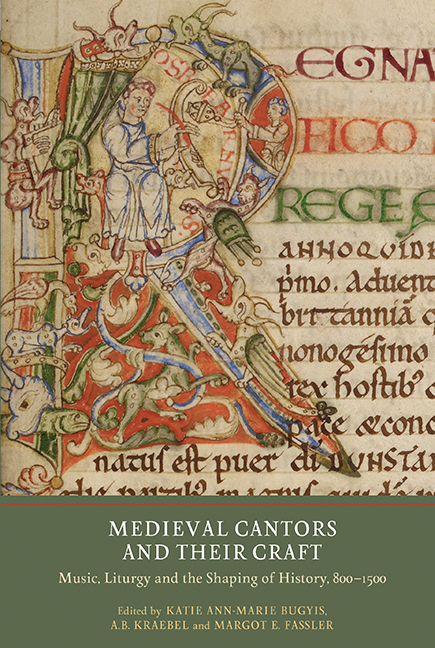Book contents
- Frontmatter
- Dedication
- Contents
- List of Illustrations
- Contributors
- Acknowledgments
- Abbreviations
- Miscellaneous Frontmatter
- Introduction
- PART I The Carolingian Period
- 1 Historia: Some Lexicographical Considerations
- 2 Liturgy and History in the Early Middle Ages
- 3 Notker Bibliothecarius
- 4 Singing History: Chant in Ekkehard IV's Casus sancti Galli
- PART II The Eleventh Century
- PART III England in the Twelfth Century
- PART IV On the Continent: Five Case Studies
- Index of Manuscripts
- General Index
- Miscellaneous Endmatter
2 - Liturgy and History in the Early Middle Ages
from PART I - The Carolingian Period
Published online by Cambridge University Press: 25 October 2017
- Frontmatter
- Dedication
- Contents
- List of Illustrations
- Contributors
- Acknowledgments
- Abbreviations
- Miscellaneous Frontmatter
- Introduction
- PART I The Carolingian Period
- 1 Historia: Some Lexicographical Considerations
- 2 Liturgy and History in the Early Middle Ages
- 3 Notker Bibliothecarius
- 4 Singing History: Chant in Ekkehard IV's Casus sancti Galli
- PART II The Eleventh Century
- PART III England in the Twelfth Century
- PART IV On the Continent: Five Case Studies
- Index of Manuscripts
- General Index
- Miscellaneous Endmatter
Summary
The Frankish historians responsible for the Annales regni francorum charted Charlemagne's visits to particular saints’ burial places to honour their cults. The regular record of where the king spent Easter and Christmas, and thus the framing of the ruler's movements within Christian time, is also a striking feature of the contemporary annalists’ account of his reign. They underscored the place of religious devotion in Charlemagne's conception of his role as ruler within his realm. Major political occasions and royal demonstrations of power, from Charlemagne's royal coronation on the feast of St Denis in 768 onwards, were orchestrated within an essentially liturgical framework. That reality underpins the narrative itself, for the celebration of Christmas and Easter provides the impetus for each successive year, recorded furthermore according to the year of the Incarnation. The Frankish representation of Charlemagne and his deeds is thus unconditionally Christian and accords significant prominence to liturgical observance.
So much is well known. Stating the obvious nevertheless prompts the questions of how and why both the Christian era and the liturgical celebration were established as possible and accepted features of an historical narrative, as instrumental in the representation of particular protagonists and their success, and as part of the literary structure of an historical text. Other eighthcentury narratives of the Franks, notably the Liber historiae francorum and the Continuations of the Chronicle of ‘Fredegar’, lack such liturgical emphasis. In the Liber historiae francorum at least, the liturgy played a decisive part in the narrative only twice. The account of the attack on Vienne when Bishop Mamertus was celebrating Mass and the royal palace was burnt relates that the bishop thereupon declared a three-day fast and the ‘three-day litany’ that the author claims is now ‘practised everywhere’. A reference to a three-day period of prayers and fasting is included in the Chronicle of Fredegar as part of the story about the remarkable (in every respect) discovery by the bishops of Antioch, Jerusalem and Constantinople of the Lord's garment from the Passion, inserted as an event in the thirtieth reign of the Frankish king Guntramn, in the same year that war broke out between Franks and Bretons. Certainly a three-day fast is also subsequently associated with the Avar campaigns in 791/3, and the process which produced the Ordinatio imperii in 817, even if the narrative sources do not tell us this.
- Type
- Chapter
- Information
- Medieval Cantors and their CraftMusic, Liturgy and the Shaping of History, 800-1500, pp. 23 - 40Publisher: Boydell & BrewerPrint publication year: 2017



